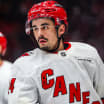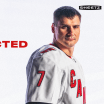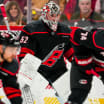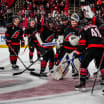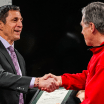SAN JOSE - It was early February 2015, just after Super Bowl weekend. The Carolina Hurricanes were on a four-game road trip that included three games out west.
While in San Jose on the final stop of the trip, traveling members of the Canes' front office met with Eric Tulsky, who was then working part-time with the organization.
Tulsky was at the forefront of a burgeoning analytics movement in hockey, and that August, the Canes hired Tulsky in a
full-time position as a hockey analyst
.
In the four years since, Tulsky has risen to the role of Vice President of Hockey Management and Strategy, leading an ever-growing data department.
Q&A with Eric Tulsky, Canes VP of Hockey Management & Strategy
Tulsky leads growing data department
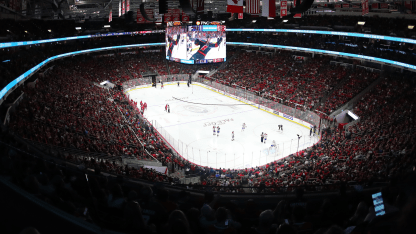
By
Michael Smith @MSmithCanes / CarolinaHurricanes.com
The
We are excited to announce that Margaret Cunniff (@mmcunniff) will be joining the team in the role of Data Scientist. Welcome aboard, Margaret!
— Eric Tulsky (@EricTulsky) October 15, 2019
, who is working with the Canes in a part-time capacity while she concludes her graduate studies at the University of California San Francisco. Come January, she'll relocate to Raleigh to become a data scientist for the team.
While the Canes were in San Jose on their most recent three-game trek through California, Tulsky met with Cunniff, whose
reads "Systems neuroscientist & hockey enthusiast."
A neuroscientist? And, Tulsky, a nanotechnologist? Working in hockey?
I sat down with Tulsky in San Jose to learn more about roles within his department, his hiring philosophies and how the Canes utilize data in various managerial and strategical decisions.
Hurricanes.com: In you time with the Canes, how has your department expanded?
Eric Tulsky: When I started off, it was just me. My training is not from a technical data science background, so I'm sort of self-taught both as a programmer and as a statistician. Early on, I was trying to cover everything and getting by where I could as a self-taught person. With each of these hires, we've added an expert in a domain area who really excels in one phase of the collective things we need to do as a department. Having the team commit to bringing in that expertise will allow us to do a lot more than I could ever possibly do on my own and do it better.
Hurricanes.com: What are the individual roles within your department, and how do you delegate and oversee various projects?
Tulsky:
Matt [Walter]
, as a data engineer, is responsible for collecting, storing and maintaining the data. So, he is building things that collect the data, managing the databases that store it, studying what technology products would be the best ways to host the data and serve it and making sure that everything is available efficiently and easily when we need it.
Kevin [Kan]
, as a developer, is responsible mostly for developing tools that access the data and make it available for people throughout the team. He builds reporting tools and things for letting people look through the data, see what we have and think about what they might make of it. Margaret, when she starts, will be working on taking the data we have and developing new insights from it, helping us figure out new things the data can tell us and helping us expand our understanding of what we know from a database perspective. My role is party managerial oversight, making sure that's all blended together and making sure we have the right priorities. A lot of times, there are different ways to read the data. A big part of my job is having intuition and experience about what is the most likely way to read the data, where it is most likely to be limited or mistaken and synthesizing that into a recommendation, actionable insight. Communication is a big part of my job, too, in conveying that understanding to the rest of the team and making sure people have what they need when they need it.
Hurricanes.com: How has analytics and the usage of data that you're collecting evolved over the last five years?
Tulsky: When I started, data analysis of hockey had been going on in blogs for several years but was just starting to be what it is with teams. I think there was just beginning to be an understanding of what the data could tell. Also at the time, the sources of data were somewhat limited, so understanding what it could tell you and what it couldn't tell you was important. A lot of the work since then has been figuring out how to fill in those gaps and expand our understanding in the areas we were blind before. That's been a big part of it. Adoption over time has increased. The more familiar people get with it, the more tools get tailored so that they answer the kinds of questions people are asking, the farther along we get in terms of being able to help people do the things they want to do.
Hurricanes.com: The NHL has partnered with
to develop and implement player- and puck-tracking. How will this new data augment the work you're doing?
Tulsky: A lot of places where there are gaps in our understanding can be filled in as we start to have player- and puck-tracking. Right now, you can take the NHL's play-by-play and figure out who was on the ice for a lot of goals by the other team, but you can't really tell whether that's because he always loses his man in coverage or the goalie just didn't make saves behind him. When you have player- and puck-tracking data, you can answer that. That's a big part of what our hires have been aimed towards, trying to start answering questions like that. Of course, a coach who watches that player every day knows how often he loses his man, but nobody watches every game in the league. Even if you do, it's hard to keep track of every player on both teams. Having league-wide data lets you start to be able to answer that kind of question.
Hurricanes.com: When you're filling out your department with new hires, are you simply looking for the best and brightest minds?
Tulsky: I have a strong belief philosophically - even before here in my previous jobs, too - that if we want to do a certain thing, my goal is not to hire the person who has the most experience doing that thing; it's to hire the most talented person who has skills that are in some way relevant to that thing. I figure if you hire the best and brightest person you can, they will figure the thing out. In the long run, whether they've done that thing before isn't going to matter as much as what their abilities are and how far they can get. That's really been my goal, so we've ended up hiring people from - Matt came from a bank, Kevin came from IBM, Margaret is a neuroscientist. It's not a traditional hockey group, but we're aiming to find the most talented people we can wherever they come from.
Hurricanes.com: And at the same time, each one of these folks is, in some way, shape or form, passionate about hockey.
Tulsky: Yeah, I think it would be hard for someone who didn't know the game at all to come in and treat it like just a generic data problem. There's always going to be certain things specific to this data set, certain subject matter. Expertise is always going to be helpful. It's certainly one of the qualifications we look for in a hire that they have an understanding of the game.
Hurricanes.com: I imagine the collective IQ of your department is pretty high.
Tulsky: It's a really bright group.
Hurricanes.com: Way too smart to be working in hockey?
Tulsky: I don't think so. I think we're just smart enough. It's a hard problem.
Hurricanes.com: Why is it a hard problem? Just because of the relative infancy of the data movement?
Tulsky: It's a complicated game. There are 12 players all moving very quickly and a puck that's moving even faster. Nothing happens in isolation, so it's all interconnected. Those interconnections are hard to tease apart. Any given situation doesn't happen very often. In baseball, when you want to figure out how valuable it is to hit a single with a man on first, there are a billion singles with a man on first in the record that you can look through and see what happened. In hockey, if you define a situation, it's a lot more complicated than a single with a man on first, so it's a much tougher problem to analyze. A lot of people look at that and say, 'Well, hockey's not like baseball. You're never going to be able to do it.' I'm glad it's not like baseball. It's harder, and that's good because you can't win at tic-tac-toe. I want it to be hard because that's what makes it possible to get an edge.
Hurricanes.com: So, in your role, what is your ultimate goal?
Tulsky: My goal isn't to build the best analytics group, it's to do the most to help the team build the best team they can. Fundamentally, our group is a support group. Analytics isn't a thing a hockey team needs to do; it's a way to help all the things the hockey team does work a little better. My goal is to help management identify and value players, to help the scouting staff identify and value players, to help the coaches identify tactics. None of that is stuff we want to do for the sake of analytics; it's stuff we want to do because we think we can help everybody else get a few percent better. That's really the aim.




